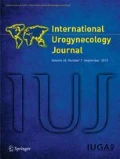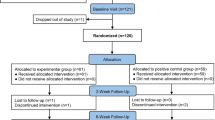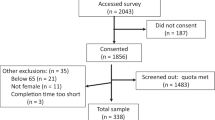Abstract:
Forty-one women completed the first phase (self-monitoring) of the Behavioral Management for Continence (BMC) intervention, while working with a nurse during home visits to reduce involuntary urine loss as part of the parent study involving older, rural women living at home. A decrease in dietary caffeine intake and an increase in fluid intake were most frequently recommended. The relationship between a decrease in the amount of dietary caffeine consumed and fewer daytime episodes of involuntary urine loss approached significance –P = 0.0744 – whereas an increase in the average amount of fluid intake was significantly related to an increase in the average volume of urine voided –P = 0.0479 – and not to involuntary urine loss.
Similar content being viewed by others
Author information
Authors and Affiliations
Additional information
Rights and permissions
About this article
Cite this article
Tomlinson, B., Dougherty, M., Pendergast, J. et al. Dietary Caffeine, Fluid Intake and Urinary Incontinence in Older Rural Women . Int Urogynecol J 10, 22–28 (1999). https://doi.org/10.1007/PL00004009
Issue Date:
DOI: https://doi.org/10.1007/PL00004009




